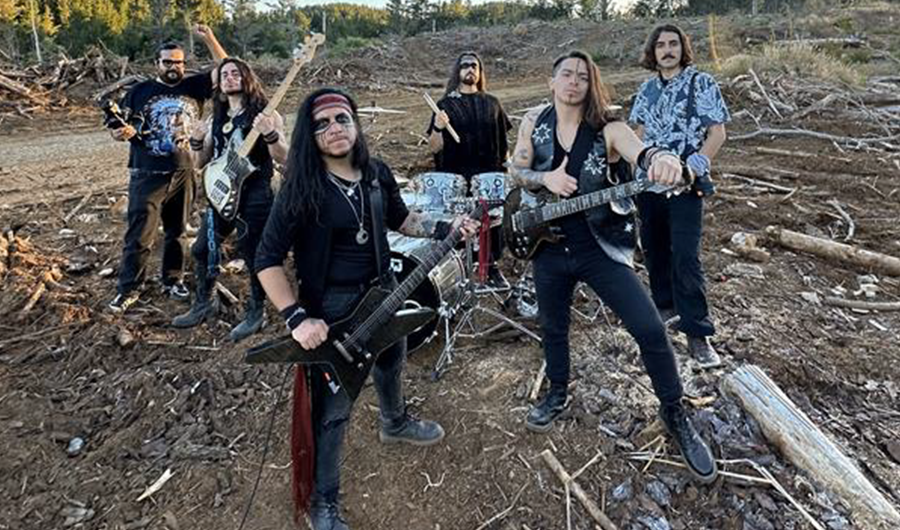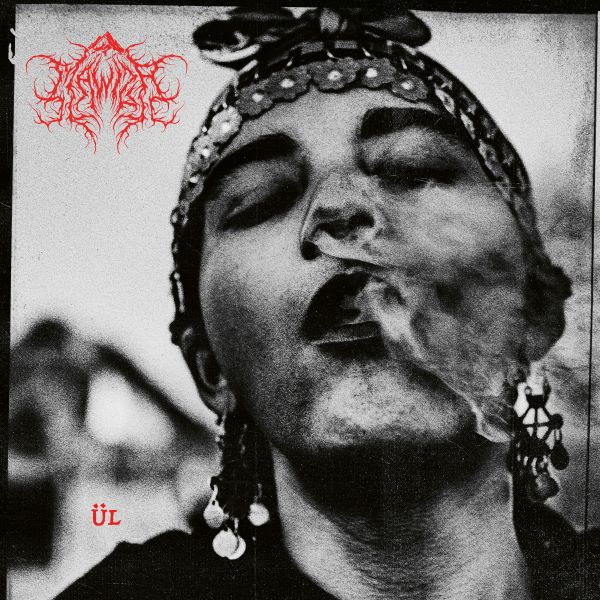
To the broad world of metal, Mawiza are still an ascendant new force, but these modern day Mapuche warriors have always stood fiercely by their indeginous roots. The band’s upcoming third album and first since winning a Chilean Grammy calls for us to restore our balance with nature. While the latest single from ÜL warnsthat the apocalypse is fast approaching, “Mamüll Reke” proudly demonstrates Mawiza’s staying power by relying on all they’ve learned from their ancestral land.
“This song is devoted to nature” Mawiza says. “If necessary, we will die to defend our land”.
Watch the video for “Mamüll Reke” on the Season of Mist YouTube channel
ÜL comes out July 18 on Season of Mist.
Pre-order & Pre-save
https://orcd.co/mawizaul
Hear Mawiza perform “Mamüll Reke”, “Wingkawnoam” and other defiant anthems from ÜL this summer when they tour Europe this summer alongside fellow Chilean metalheads Ater.
Beyond Somber 2025 European Tour
more dates to be announced!
July 16 – Maribor, Slovenia @ Gustaf Pekarna
July 17 – Miskolc, Hungary @ Zugivo
July 18 – Deva, Romania @ John’s La Cetate
July 19 – Targu Jiu, Romania @ Piano
July 20 – Sibiu, Romania @ Rock & Bike
July 21 – Timisoara, Romania @ Nemesis
July 22 – Brasov, Romania @ La Templarie Pub
July 23 – Arad, Romania @ Club Flex
July 24 – Budapest, Hungary @ Riff
July 25 – Szeged, Hungary @ Varosi Club
July 26 – Pecs, Hungary @ Vararok
July 27 – Ostrava, Czech Republic @ Barrack
July 31 – Pinerolo, Italy @ Spazio Nino
August 1 – Barberaz, France @ Brin De Zinc
August 2 – Ostend, Belgium @ B52
Before banding together in 2014, Mawiza had already seen the Mapuche Nation endure tremendous upheaval. Half of the video for “Mamüll Reke” was filmed on Mapuche territory in southern Chile, outside the city of Valdivia, that is now controlled by two timbre companies. “Txekalefuy küllfün piwke / We walked with pride in our hearts“, Awka sings during the song’s somber opening verse, accompanied by dry scuffling snare, a raw buzzing bass line and fields of tree stumps.
“Trees are sacred to the Mapuche”, Mawiza says. “They are a source of strength. But now, the native forest is being completely erased by corporations who have taken over our territory”.
With its quick-fire double bass and cavernous growls, “Mamüll Reke” might sound like a world that’s on the verge of collapse. But at its core, the latest single from ÜL is steeled by the resilience and resistance of not only the Mapuche people but also the land. In English, the song translates to “Just Like the Tree”. Soaring above the clouds with brightly piercing flute, the enchanting chorus summons its harmonious energy with a mournful Afafan war cry. Mamüll reke / Lhalu witxan / Afafalen / Lhayaiñ ka (Just like the tree / that dies standing / chanting the war cry / we will die too).
“This is one of the most melodic songs on ÜL“, the band says. “We wanted it to bring the same energy that you carry into battle. We will die like a burning tree standing. Because nature has taught us everything we are”.
The other half of the “Mamüll Reke” video was filmed amidst a native forest in the nearby Kalfvgen Community that’s overseen by local Machi Paola Aroca Cayunao. This medicine woman invited Mawiza after accompanying them to their set at Fluvial 2024. “We have come to share a great relationship with her”, Awka says. “There is a great energy amongst the land where she lives. The environment is great for soaking in the spirituality of the Mapuche”.
It’s only during this portion of the video that Awka dances the Pürun, mirroring the ostriches that are often spotted around his home city of Temuco. With their feet now back on native ground, “Mamüll Reke” ends with images of native plants returning to the barren soil, as if awakened by the band’s heavy, grooving, ancestral rhythm.
“The Mapuche are still standing”, says Mawiza. “You can cut us down, but if one falls, ten shall rise”.
The video for “Mamüll Reke” was directed and edited by Andrés Hetzler (@andreshetzler).
Additional video credits
Camera & Drone Operator – Roberto Urzúa
Colorist – Soledad Gatica
Executive Producer – Unai Garcia
Producer/Art Director – Awka Nawel
Praise for Mawiza
“Mawiza represent and honor their powerful Mapuche heritage, amplifying its relevant message of connection with our roots and the universe as a whole. And they do so with determination and in the most modern way, with heavy riffs and an openness to new ideas and to the world. A conversation between past, present and future. Don’t give up the fight!” – Joe Duplantier of Gojira
“…a roar of Mapuche pride out of Chile’s metal scene” – RollingStone
“Mawiza cut through the noise with their own signature cocktail of chainsaw guitars, guttural vocals and ancestral Mapuche wisdom they’ve dubbed ÜL Metal” – Bandcamp
“the band uses their music to channel strength and keep history alive” – Decibel
“a new and fresh sound of modern metal, but reimagined as if it had been born in the heart of the wallmapu, mixing and creating sounds typical of their culture” – The Resistance
“a heavy proposal merged with elements of Mapuche culture, preserving and making visible its roots, traditions and its struggles, resulting in a unique style” – Futuro

Tracklist
1. Wingkawnoam (3:38) [WATCH]
2. Pinhza Ñi pewma (4:29)
3. Ngulutu (3:50)
4. Nawelkünuwnge (5:06)
5. Mamüll Reke (4:24)
6. Wenu Weychan (6:13)
7. Lhan Antü (4:08)
8. Kalli Lhayay (3:58)
9. Ti Inan Paw-Pawkan (featuring Joe Duplantier from Gojira) (4:42)
Tracklist (English Translation)
1. To Decolonize (3:38) [WATCH]
2. Hummingbird Dream (4:29)
3. Western Storm (3:50)
4. Become a Cougar (5:06)
5. Just Like The Tree (4:24)
6. The War of the Sky (6:13)
7. Dead of the Sun (4:08)
8. Let It Die (3:58)
9. The Last Harp Call (featuring Joe Duplantier from Gojira) (4:42)
ÜL means “chant” in Mapuzugun. The album represents the voice of the land, the origin of feeling, the first call to connect with emotions. It is the materialization of a part of the spirit that, for a few seconds, becomes one with the wind—a force we can hear, resonate, communicate with, and return to. ÜL is Mawiza’s indigenous chant, and like smoke, it rises as a message to the skies.
Like their Mapuche ancestors, Mawiza always look back. ÜL chants to awaken the energies that have fallen asleep in the land, using the power of the great cities to resist the noise of imbalance. In this way, the album becomes another element of nature, a force defending itself, speaking in its own language to keep fighting and condemning those who continue to futilely subjugate their own strength.
With ÜL, Mawiza present themself to the world with a decolonizing and empowering mission. The album proclaims that nature possesses consciousness and spirit. Opening song “Wingkawnoam” emphasizes the importance of indigenous Mapuche thought by following dreams as precise guides for one’s path in life.
“Pinhza ñi pewma” is a dream that Mawiza’s vocalist Awka had during a time when hummingbirds were nowhere to be seen. Their chant was absent and the chilco plant was disappearing. In Awka’s dream, four hummingbirds came to feed on the blood from his fingertips, as if it were nectar flowing from the flowers of the chilco.
ÜL pays tribute to nature and Mawiza’s ancestors. “Ngulutu” recalls ancient battles between the Mapuche and the Spanish in Santiago, Chile. “Mamüll Reke”, “Wenu Weychan”, “Lhan Antü”, and “Kalli Lhayay” are filled with rhythms and sounds reminiscent of the most hermetic rituals of the Mapuche people. They were used by shamans to induce trance and heal the sick, to communicate with and greet the spirits of the mountains.
Closing song “Ti Inan Paw-pawkan” features chants from members of Mawiza’s indigenous community, as well as Gojira frontman Joe Duplantier. It is here, during the album’s finale, that the band stake their claim as both indigenous and urban. The song acknowledges the mission entrusted to Mawiza by Mapuche authorities and by the land itself: to raise awareness about balance on Earth in an empowered way and to call for greater attentiveness to Mapuche territory. Otherwise, the consequences will be dire.
Lineup
Awka – Vocals & Rhythm guitar
Karü – Lead guitar & backing vocals
Zewü – Bass & backing vocals
Txalkan – Drums & percussion
Guest musicians
Fabiola Hidalgo (Liquen) contributes vocals to “Wingkawnoam”, “Pinhza Ñi pewma”, “Ngulutu” and “Mamüll reke”
Joe Duplantier (Gojira) contributes vocals to “Ti Inan Paw-Pawkan”
Follow Mawiza